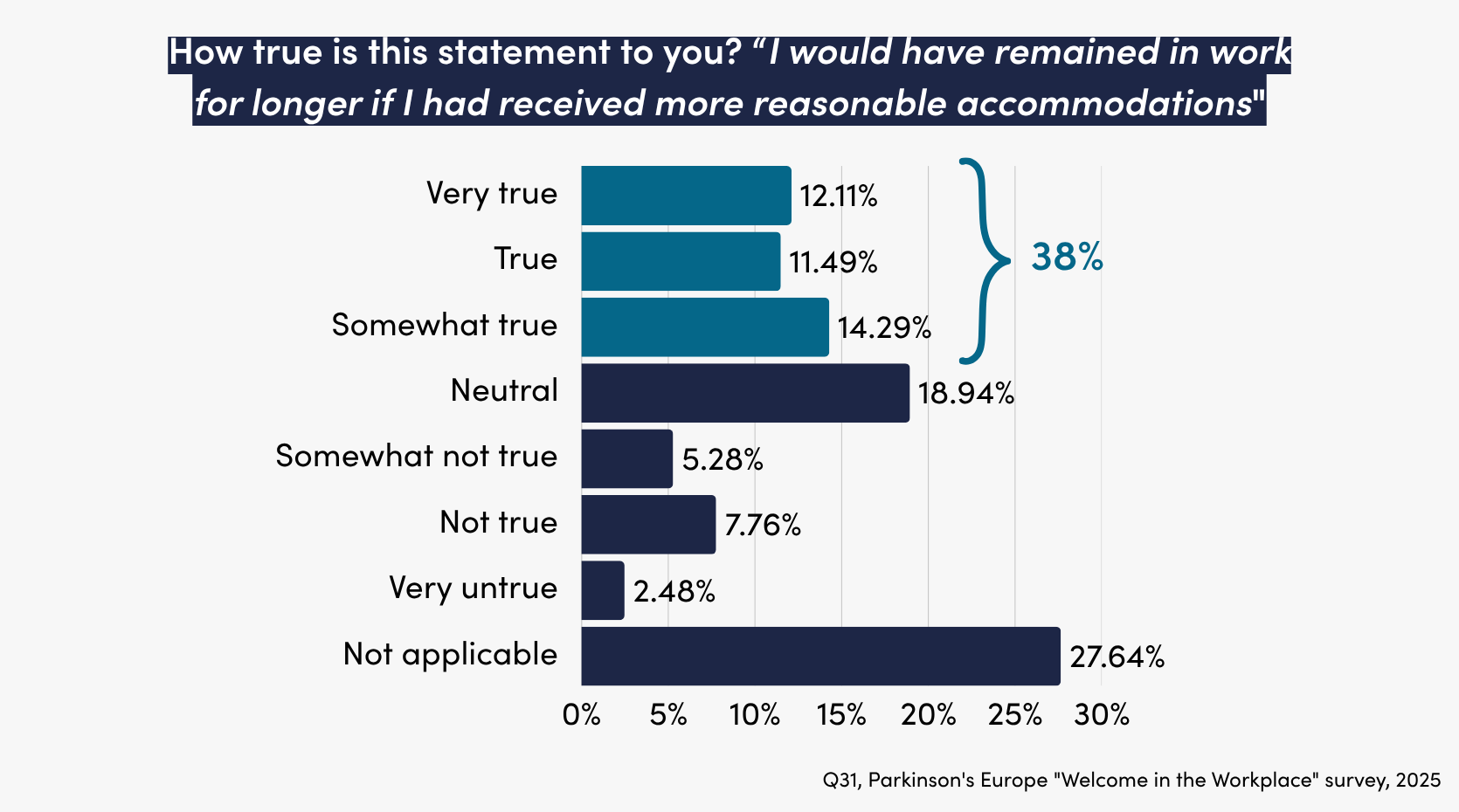November 4, 2025
Working with Parkinson’s: What a New Survey Says About Jobs, Money, and Stigma for People with Parkinson’s
With the right accommodations—and better awareness of legal rights—many people with Parkinson’s could work longer and avoid serious financial losses, but fear of stigma and lack of information still shut too many doors.
The Survey
Parkinson’s Europe ran an online survey to understand what it’s like to work while living with Parkinson’s. They asked 896 people (mostly from Italy, France, and the UK, with some from other countries like Australia, India, and Japan) about disclosure at work, accommodations, employer reactions, and money. The article reporting the results was published Oct 22, 2025.
In Short
The findings show that people with Parkinson’s would often remain in work longer if the right support and adjustments were available. The survey reports that approximately two in five respondents believe they would have stayed on the job for longer had their workplace offered more “reasonable accommodations”.
Rights at Work
However, the number of people aware of their rights at work remains disappointingly low. Nearly two-thirds of those surveyed said they were not familiar with the “right to reasonable workplace accommodations”. Disclosure of a Parkinson’s diagnosis at work continues to be fraught with difficulty and fear. While just over half of respondents (around 54 %) told their employer immediately upon diagnosis, nearly a quarter waited until symptoms began to affect their work, and more than one in five chose not to disclose at all. The motivation behind delayed or non-disclosure is strikingly consistent: fear of stigma, job loss, being treated differently. Among those who didn’t disclose or delayed disclosure, 42 % named the fear of being marginalized or discriminated against.
On the financial front the survey uncovers substantial impacts. A majority of respondents (around 58 %) felt that their financial security had been affected by their Parkinson’s diagnosis. About one-third estimated annual losses exceeding €20,000, and 11 % said those losses were more than €50,000 per year.
Despite the challenges, the employer responses reported were encouraging in many cases. Many people shared that their employer responded positively when informed of the diagnosis, though a minority — about 7 % — reported a “very negative” response.
The survey paints a clear message: continuing to work and remaining valued in a professional role with Parkinson’s is absolutely possible — but it often depends on awareness, accommodations and a workplace culture that sees ability, not disability. With so many people unaware of what they are legally entitled to, and with stigma still a strong undercurrent in disclosure decisions, the findings suggest there is significant work ahead, both in policy and in practice.
From an advocacy perspective, the implications are strong. Educating people with Parkinson’s about their workplace rights is essential. Equally important is engaging employers — particularly smaller businesses or those without formal disability-inclusion policies — to recognise that reasonable adjustments (such as flexible hours, role-modification or leave for health appointments) are not merely charitable-extras but can enable experienced people with Parkinson’s to contribute meaningfully for longer. The financial and human-value cost of early exit from the workforce is high. For someone living with Parkinson’s, work is about more than income: it’s about identity, purpose and connection.
What this means
1. Knowledge gap is real
The fact that almost two-thirds of those surveyed didn’t know about their rights around accommodations shows a significant information/empowerment gap. For people living with Parkinson’s this means that potential supports may go unused simply because they don’t know they exist.
2. Work accommodations make a difference
The 40% of respondents who said they’d have stayed in work longer if supports were in place underlines that putting accommodations into practice isn’t just a “nice to have” — it can extend working life, preserve income, maintain identity and meaning.
3. Stigma & fear are still influential
Even though many employers responded positively when diagnosis was disclosed (for example, almost half said their employer was “very supportive”), the fear of discrimination or being treated differently is strong enough to cause many not to disclose or ask for help. This suggests that culture and attitude matter as much as policy.
4. Financial impact is substantial
With many estimating losses of €20K+ annually, and some more than €50K, Parkinson’s isn’t just a health challenge — it’s a socioeconomic one. For advocates, this kind of data is powerful when making the case for policy change, employer training and disability-rights enforcement.
Implications for advocacy & next steps
Employer and workplace toolkits: Use the data to build a “What employers need to know about Parkinson’s and work” resource. Highlight common accommodations (flexible hours, health-appointment leave, adjusted duties) and show how they can benefit both employee and organisation.
Awareness campaigns for people with Parkinson’s: Develop modules or briefs for people diagnosed with Parkinson’s so they know their rights, the questions to ask their employer and how to plan disclosure or adjustments.
Policy-maker briefings: With data on retention potential (the “stay longer if supported” stat) and financial loss, you can build the business case for governments to fund workplace supports, early intervention and employer incentives.
Culture change in workplaces: Focus on reducing stigma — include real-life stories (the survey had many) about people living with Parkinson’s who work or shifted roles. Encourage workplaces to have open disability policy, visible leaders talking about chronic conditions, and inclusive practices.
Measurement & monitoring: Since the survey is Europe-wide but doesn’t necessarily drill down at country-by-country level in published summaries, consider working with Canadian or regional Parkinson’s organisations to replicate a similar survey locally. That could help build the evidence base in Canada, which strengthens your advocacy work globally.
As someone with lived experience and a voice in the Parkinson’s-advocacy space, you’re uniquely positioned to help bridge the gap between data and action. Telling real-world stories, linking policy to lived experience, and showing employers the “how” (not just the “why”) for inclusion will make a difference.
Big picture
Many people with Parkinson’s can keep working longer if workplaces provide reasonable accommodations (like flexible hours or time off for medical appointments). But lack of knowledge about rights, fear of stigma, and financial pressure push a lot of people out of work earlier than they’d like.
Key findings (plain language)
People would stay in work longer with support. About 2 in 5 respondents said they would have stayed in their jobs longer if more reasonable accommodations were available. Common helpful supports included flexible hours and time off for appointments.
Many don’t know their rights. Nearly two-thirds (63%) said they were not familiar with their legal right to workplace accommodations. Almost half (47%) weren’t familiar with general employment protections for disability/health conditions in their country.
Fear holds people back from asking. 26% didn’t realize they could ask for adjustments at all; 15% didn’t ask because they worried it would change how they were treated; and 9% said they asked but were refused.
Disclosure is complicated. 54% told their employer right away; 24% waited until symptoms affected work; 22% didn’t disclose at all. The top reason for not disclosing was fear of stigma—being sidelined, treated unfairly, or losing a job/contract.
Employer reactions aren’t all bad. Almost half experienced a very supportive employer response after disclosure, though about 7% reported a very negative response. Among colleagues/clients, 28% reported very supportive reactions and 3% very unsupportive.
Money takes a hit. 58% felt their diagnosis hurt their financial security. Reasons included added health costs, reduced hours, early retirement, or needing disability benefits. About one-third estimated annual losses over €20,000, and 11% said over €50,000 a year.
Why it matters
Human impact: People with Parkinson’s want to keep contributing, but fear and confusion about rights can shorten careers unnecessarily.
Policy gap: EU law protects the right to “reasonable accommodations,” yet awareness and enforcement are uneven. Better education and clearer processes could reduce early exits from the workforce.
Equity: Without accommodations, people absorb both income loss and extra costs, widening inequality.
What should change (evidence-based suggestions)
Make rights visible and simple. Employers, unions, and health orgs should share plain-language guides on how to request accommodations, with examples of what’s “reasonable.”
Normalize disclosure and anti-stigma training. Train managers and teams so disclosure doesn’t lead to bias or sidelining. Share real stories of positive accommodations.
Standardize common supports. Default options like flexible start times, remote work when possible, and time for appointments should be easy to approve. Track approvals and refusals.
Financial safeguards. Strengthen pathways to benefits and explore employer or public subsidies for accommodation costs, since financial loss is so high for many.
Limitations to keep in mind
Sampling: It’s an online survey with most responses from a few European countries, so results may not represent every region or job type.
Self-report: Findings rely on how people remember and interpret their experiences; there’s no employer verification.
##







